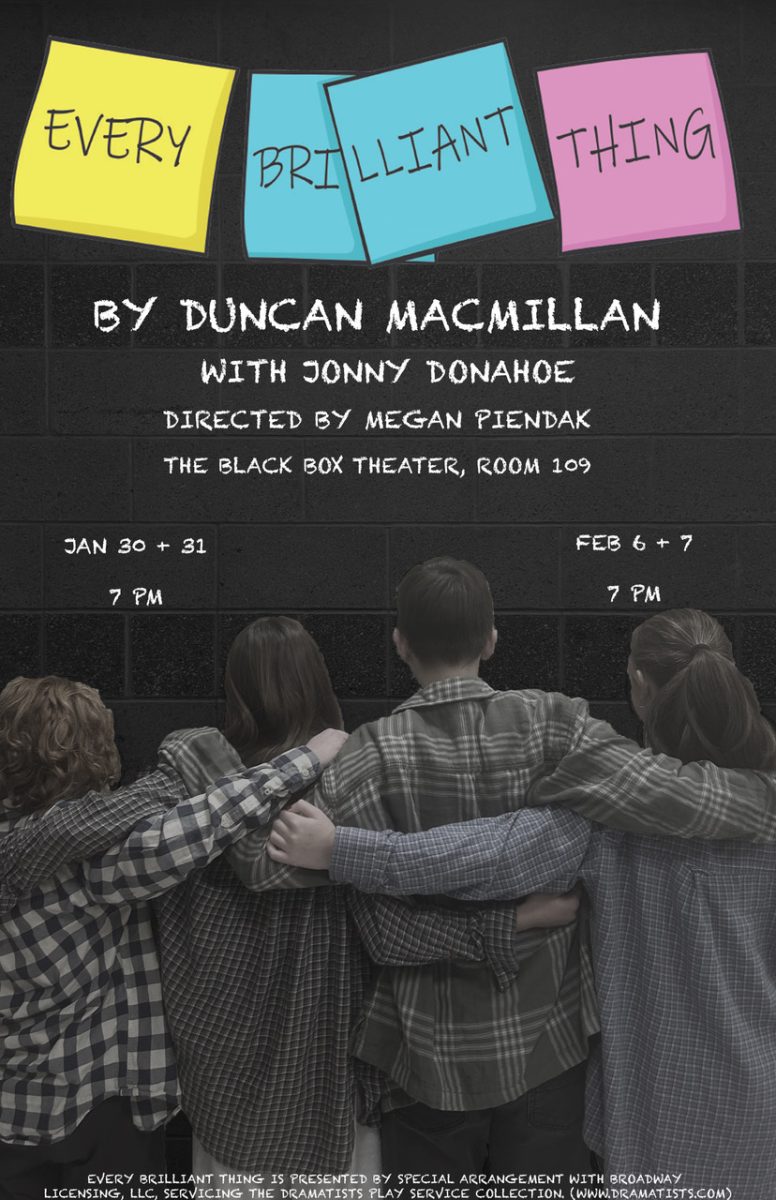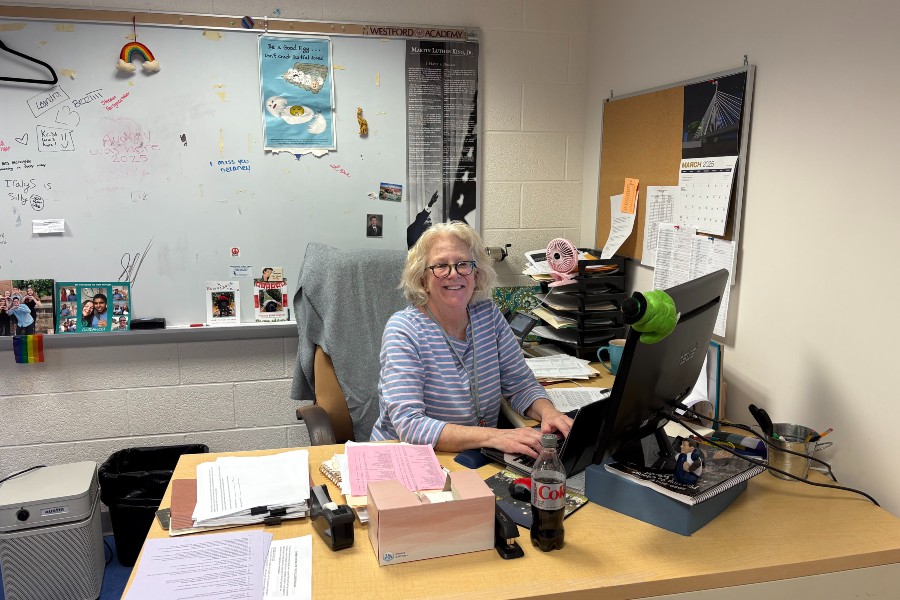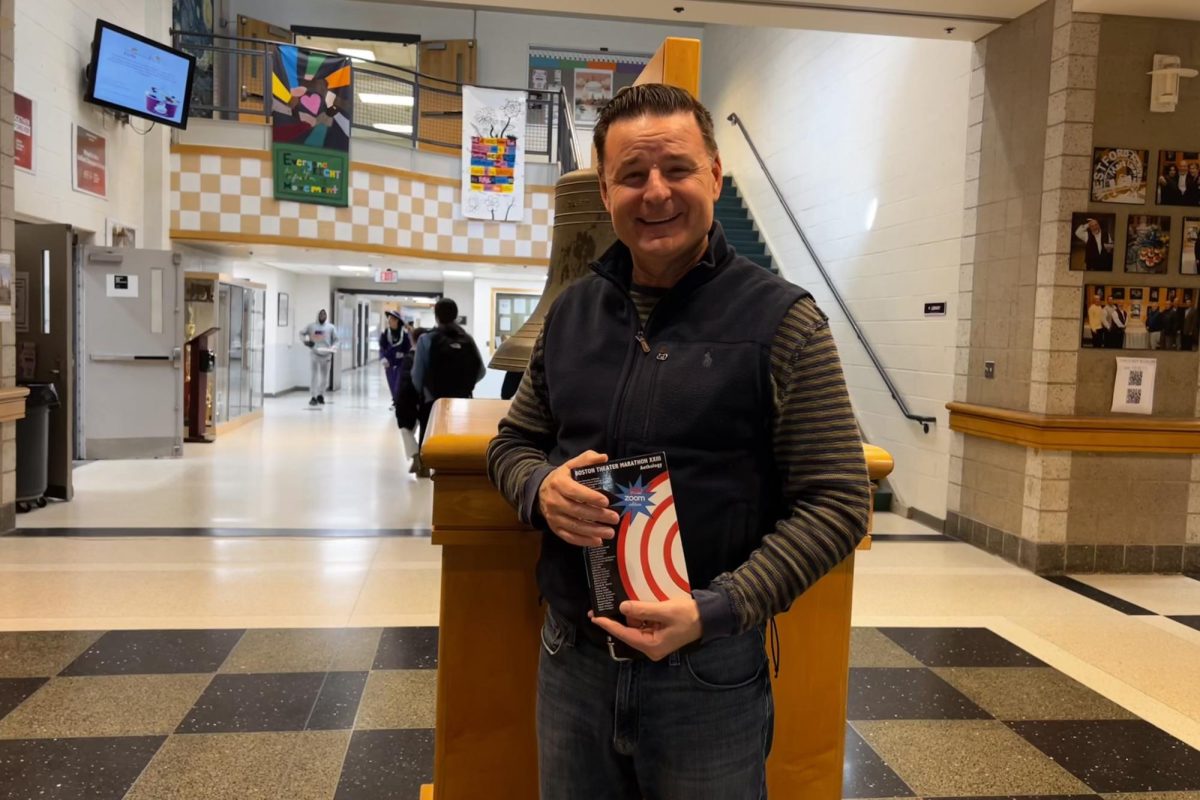Content Warnings: Suicide, depression, and loss of a pet
Creative directing decisions can make or break a production, whether small or large. While it can be difficult for directors to take the big step of altering a play’s script, it is often necessary in order to adapt the play to better fit the specific cast or production. For senior director Megan Piendak, the risky decision to turn a one-man play into a play for four different actors was clear and necessary.
WATA will be performing their winter season black box production, Every Brilliant Thing, directed by Piendak, from Feb. 6-7 at 7:00 p.m. in the black box theater, room 109. All General Admission seats can be purchased at the door at $10 for adults and $5 for students and seniors.
Written by Duncan MacMillan and Jonny Donahoe, the play contains difficult themes such as depression, suicide, and the loss of a pet as an unnamed main character referred to as “Narrator” creates a list of all the brilliant things in the world to cope with their mother’s suicide attempts. The play takes viewers through the Narrator’s life, from their life as a child as young as 7 years old to their eventual marriage as a middle-aged person. As the Narrator gets older, the list starts to take on new meanings and takes on a life of its own.

In WATA’s production of the play, freshmen Austin Kane, Iris Ledell, Abby Mantenuto, and June Viera, collectively play the role of “Narrator” which was a decision that Piendak had made with the help of WATA artistic director Michael Towers and Associate Artistic Director Maggie Sulka. Originally, Piendak had planned to cast two people and have them each perform two nights, keeping it as a one-man show, but in the end, she felt that having a four-person cast would be a better way to tackle the script.
“The decision for 4 actors was made, as all WATA-related [decisions] are, [by asking] ‘what provides the most reasonable and success-driven opportunities for the most number of deserving students possible?'” Towers said. “Four is greater than one and likely provided a greater chance of success for the show.”
To turn the one-man show into a show with a multi-person cast, Piendak took her script and broke it into chunks, based on where she thought there were natural beats or stopping points between action in the play. According to Piendak, once she had cast the four underclassmen in the production, she started assigning the parts to people based on who she could see saying each line. The final step was figuring out how to have them all move and exist in the same space since the actors all play the same person but each have their own lines and actions.
According to Piendak, she is proud of her cast because they work so well together, playing off of each other beyond her greatest imagination. Despite the cast members playing one person collectively, each actor contributes something new to the show.
“I think what really drew me to these four people is that they all have their own strengths […] Iris, the emotion that plays across her face when she’s acting, especially in such a small space like this, is unmatched,” Piendak said. “Austin is really funny, and this play does have its fair share of comedic elements, […] so having a comedic actor like Austin, who is always saying ‘yes, and?’ is just incredible. Abby just has so much nuance in her acting that [are] just more verbal, emotional switches. It’s again, unmatched. And then June just has such a good understanding of the script and is able to use that as a really solid foundation to build this really intricate character with a lot of depth on top of it.”
Because Every Brilliant Thing is a black box show, all tech opportunities and acting opportunities were only open to freshmen and sophomores. Although the number of cast and crew members is small, they were able to put on two successful shows already on Jan. 30-31 with the help of sophomore assistant director Phoenix Dailey, sophomore stage manager Kali Seiger, freshman scenic and properties designer Anne Sophie Khripin, lighting technician sophomore Eli Weatherwax, and freshman sound technician Marta Lainez Clapers.
“Our first two shows went great,” Dailey said. “We got a lot of people to come, and they were the best runs our team did so far. Everyone really seemed to be having a great time, and there was a lot of positive feedback too. I think these next two shows are gonna be even better because we have the chance to make some fixes and improve things we realized didn’t go as planned during our first two shows. It’s definitely tough to predict what the audience is going to do, especially because there is so much audience participation [in the show], so a lot of our fixes will be focused on that.”








